Sülfasalazine Bağlı Psikotik Özellikli Majör Depresif Bozukluk
Sulfasalazine-Induced Major Depressive Disorder With Psychotic Features
___
- 1. Onen F, Akar S, Birlik M, Sari I, Khan MA, Gurler O ve ark. Prevalence of ankylosing spondylitis and related spondyloarthritides in an urban area of Izmir, Turkey. J Rheumatol 2008;35 (2):305-309.
- 2. Chen J, Liu C. Sulfasalazine for ankylosing spondylitis. Cochrane Database Syst Rev 2005;18 (2):CD004800.
- 3. Joshi P, Dhaneshwar SS. An update on disease modifying antirheumatic drugs. Inflamm Allergy Drug Targets 2014;13(4):249-261.
- 4. Russinko PJ, Agarwal S, Choi MJ, Kelty PJ. Obstructive nephropathy secondary to sulfasalazine calculi. Urology 2003;62(4):748.
- 5. Simon LS. The treatment of rheumatoid arthritis. Best Pract Res Clin Rheumatol 2004;18:507-538.
- 6. Capell H, Madhok R. Disease-modifying antirheumatic drugs 2: sulfasalazine. Rheumatology, 4th ed. Philadelphia: Mosby Elsevier;2008. p. 437-47.
- 7. American Psychiatric Association, Desk reference to the Diagnostic Criteria for DSM-5, Arlington, APA, 2013.
- 8. Rebrov VG, Lukomskii MI. A case of depression in the treatment of nonspecific ulcerative colitis with sulfasalazine. Klin Med (Mosk) 1989;67 (8):106.
- 9. Jajic Z, Jajic I. Acute psychoses in patients with psoriatic arthritis during treatment with sulfasalazine. Reumatizam 1998;46(1):43-4.
- 10. Gulec G, Yenilmez C, Ayranci U. Sulfasalazine plus chloroquine-induced mood disorder in a patient with rheumatoid arthritis. Iran J Med Sci 2009;34(1):72-75.
- ISSN: 1300-7416
- Yayın Aralığı: Yılda 4 Sayı
- Başlangıç: 1994
- Yayıncı: SDÜ Basımevi / Isparta
Operasyon Odasında Akciğer Koruyucu Mekanik Ventilasyon Stratejileri
Çiğdem KÜÇÜKEŞMEN, Esra KARAAĞAÇ
Disfonksiyonel Uterin Kanamalı Kadınlarda Hemogram ve Hormon Parametrelerinin Karşılaştırılması
Muzaffer TEMUR, Tayfur ÇİFT, Fatma Nurgül AKTAŞ, Özgür YILMAZ, Umut Gök BALCI, Betül DÜNDAR, EMİN ÜSTÜNYURT
Ahmet Gökhan GÜNDOĞDU, Ahmet GÖKHAN, Hasan Ekrem ÇAMAŞ, Rasih YAZKAN
Vücut Kitle İndeksinin Unikondiler Diz Artroplastisinin Klinik Sonuçlarına Etkisi
A. Meriç ÜNAL, SABRİYE ERCAN, Ahsen OGUL, Yurdagul BAYGUL, Cem ÇETİN
SABRİYE ERCAN, Hilmi Mustafa DEMİR, YurdagülBaygül ATALAY, Ozan TURGAY, TOLGA ATAY, CEM ÇETİN
Alveoler Yarık Onarımında Tersiyer Greftlemenin Volümetrik Analiz Yöntemiyle Değerlendirilmesi
Sublingual Nonsendromik Soliter Nörofibrom Olgu Sunumu
Mehmet Emrah CEYLAN, Gözde CEYLAN, Mustafa TUNÇ
Sülfasalazine Bağlı Psikotik Özellikli Majör Depresif Bozukluk
Ali KANDEĞER, Hazan M.D**. TOMARBOZKURT, Güneş Devrim KICALI, ÖZKAN GÜLER
